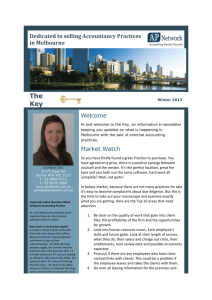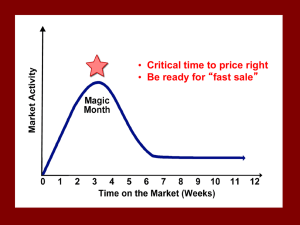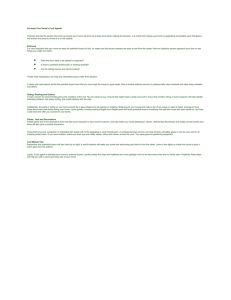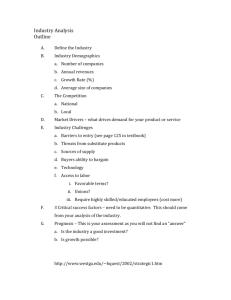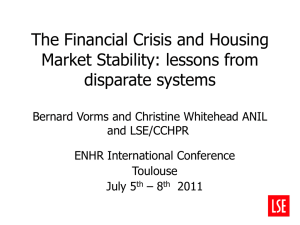doc
advertisement
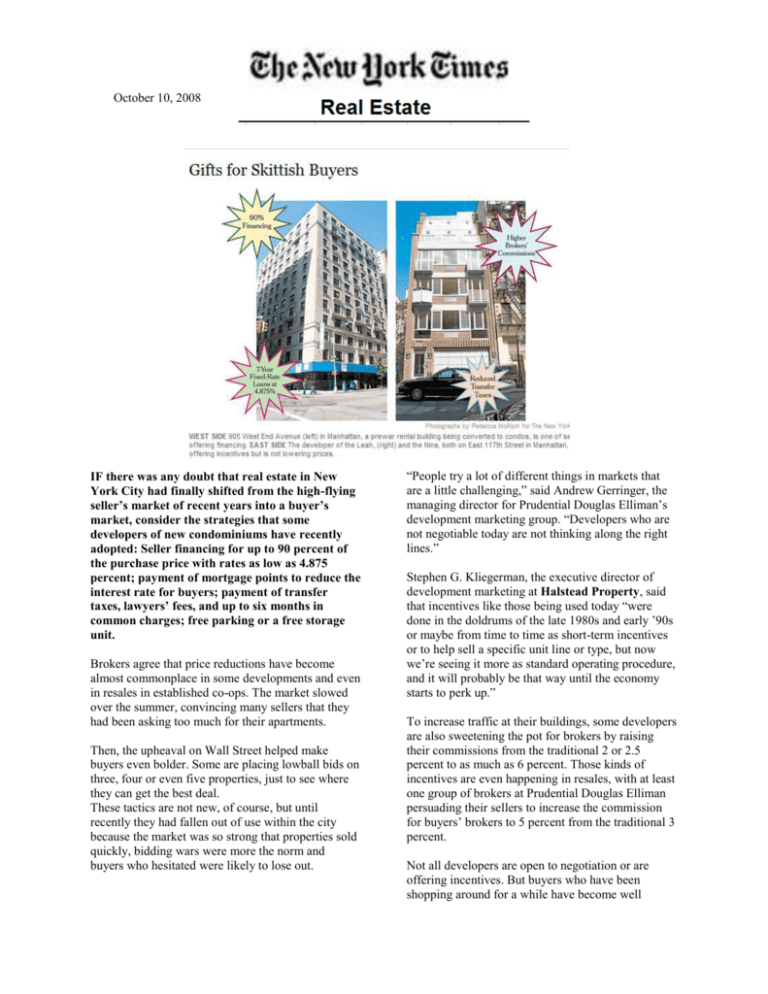
October 10, 2008 IF there was any doubt that real estate in New York City had finally shifted from the high-flying seller’s market of recent years into a buyer’s market, consider the strategies that some developers of new condominiums have recently adopted: Seller financing for up to 90 percent of the purchase price with rates as low as 4.875 percent; payment of mortgage points to reduce the interest rate for buyers; payment of transfer taxes, lawyers’ fees, and up to six months in common charges; free parking or a free storage unit. Brokers agree that price reductions have become almost commonplace in some developments and even in resales in established co-ops. The market slowed over the summer, convincing many sellers that they had been asking too much for their apartments. Then, the upheaval on Wall Street helped make buyers even bolder. Some are placing lowball bids on three, four or even five properties, just to see where they can get the best deal. These tactics are not new, of course, but until recently they had fallen out of use within the city because the market was so strong that properties sold quickly, bidding wars were more the norm and buyers who hesitated were likely to lose out. “People try a lot of different things in markets that are a little challenging,” said Andrew Gerringer, the managing director for Prudential Douglas Elliman’s development marketing group. “Developers who are not negotiable today are not thinking along the right lines.” Stephen G. Kliegerman, the executive director of development marketing at Halstead Property, said that incentives like those being used today “were done in the doldrums of the late 1980s and early ’90s or maybe from time to time as short-term incentives or to help sell a specific unit line or type, but now we’re seeing it more as standard operating procedure, and it will probably be that way until the economy starts to perk up.” To increase traffic at their buildings, some developers are also sweetening the pot for brokers by raising their commissions from the traditional 2 or 2.5 percent to as much as 6 percent. Those kinds of incentives are even happening in resales, with at least one group of brokers at Prudential Douglas Elliman persuading their sellers to increase the commission for buyers’ brokers to 5 percent from the traditional 3 percent. Not all developers are open to negotiation or are offering incentives. But buyers who have been shopping around for a while have become well versed in the kinds of discounts available, and are using that knowledge as a bargaining tool. “When developers drove the market, they determined how it played out,” said Terry Naini, a vice president at Prudential Douglas Elliman. “But now buyers have more of a say, and they can say, ‘If you don’t give me this, I can go next door where they are giving it to me.’ ” Ms. Naini recently helped a pair of clients, Gina Schmeling and Alani Golanski, buy a large twobedroom with a terrace at the Belltel Lofts in downtown Brooklyn for just under $1.5 million. Ms. Schmeling said that negotiations went at a pretty fast clip, and that in the end, they paid about $85,000 below the asking price. The developer also agreed to a mortgage tax assignment, a complex legal maneuver that saved the couple about $20,000 in mortgage taxes. “That made a big difference to us,” Ms. Schmeling said. Developers are offering financing incentives as a way to avoid actually cutting their prices. But while a few advertisements can be found trumpeting buyer bonuses, most developers are not publicizing their incentive programs and present them only to potential buyers at their sales offices. “They’re being a lot more cautious about how they react to a potentially changing market,” said Mr. Kliegerman of Halstead. He said that at the sales office for 540 West 28th Street, which opened just last week, the developer will let buyers use the building’s concierge service from the day they sign a contract, even if they are not scheduled to move into the building for another year. Brokers will also be offered an extra one percentage point on their commission, for a total of 4 percent, just for coming to the sales office and previewing the property before taking buyers to the building. “I lived through the doldrums from 1989 to 1994,” Mr. Kliegerman said, “and I learned that in order to assure that you continue to be successful, you don’t chase the market — you get in front of it. Developers understand that by adding value for buyers, they might lose some money, but it keeps properties moving and they will sleep better at night.” Many of the financing incentives are a direct response to the tightening of the credit markets, which has made it much more difficult for buyers, especially first-timers, to get a mortgage at a reasonable rate without having to make a huge down payment. At 905 West End Avenue, a 53-unit prewar rental building being converted to a condo, the developer, Samson Management, is offering 90 percent financing on seven-year mortgages at 4.875 percent. The loans have the same monthly payments as 30year mortgages, but buyers will have to refinance after seven years. The offer is good only through Nov. 4. “You can’t get 90 percent financing anywhere right now, not even through private lending,” said Louise Phillips Forbes, an executive vice president at Halstead Property who is heading sales at the building. She said several buyers were considering the financing program, “and they are all finance-able; they have held mortgages and never had a late payment; they are people that any bank under normal circumstances would be throwing money at.” A similar financing plan is already working at the Fitzgerald, a 46-unit building on West 117th Street, where five buyers have taken advantage of sponsor financing offering seven-year mortgages with fixed rates of 5.34 percent. “They’ve deemed it advantageous not to have to go through the brain damage and trouble of applying to banks and facing possible rejection,” said Robert Friedman, the developer. A more common financing bonus is an interest rate buy-down plan, in which a developer will pay one or two points on a buyer’s mortgage to reduce the mortgage rate by one or two percentage points. The cost to a developer varies depending on the size of a mortgage, but it can invariably save buyers hundreds of dollars in monthly payments. The Azure, a 34-story tower under construction on East 91st Street, started running ads late last month offering programs that provide savings of “as much as 10 percent per annum in the carrying costs of a JPMorgan Chase mortgage.” Nancy Packes, the president of the project marketing division of Brown Harris Stevens, which is handling sales at the Azure, said the sponsor had agreed to pay points to lock in current interest rates for an 18month period so that buyers need not worry that their mortgages will cost more when the building is finally completed. “There’s apprehension over the current credit crisis,” she said, “and we’re offering tools that directly meet those concerns.” The sponsor has also offered to buy down mortgage interest rates by one percentage point. According to the sponsor’s estimates, on a one-bedroom apartment selling for $1.095 million at a current interest rate of 6.13 percent, monthly mortgage payments would come to about $4,474. But with the interest rate buydown bringing the rate to 5.13 percent, monthly payments would be only about $3,744. The estimated monthly savings with the incentives are $730, and the annual savings are $8,760. In fact, the actual savings, 16 percent, exceed the 10 percent advertised. Incentives can be found in Manhattan, Brooklyn and Queens, and at big and small developments alike. Jessica Armstead, a vice president at the Corcoran Group who is handling sales at the Nina and the Leah, two small buildings on East 117th Street, said the developer for the two buildings decided this month to pay half of the state and city transfer taxes, a cost usually foisted on buyers. For a one-bedroom penthouse at the Nina, which is asking $599,000, transfer taxes would total nearly $11,000. Brokers who bring buyers who sign contracts before Nov. 1 have also been promised 4 percent commissions and $500 American Express gift cards. “We haven’t reduced prices, because the apartments are priced fairly,” Ms. Armstead said. But reducing “the transfer taxes is pretty significant — you could furnish the apartment with the savings.” Perhaps the developments most in need of buyer incentives are those that are not yet completed, because buyers might worry that a developer could run into financial difficulties and might not ever finish the building. Kenneth S. Horn, a principal at Alchemy Properties, which has been developing condominiums in Manhattan since 1990, said sales at two properties finished in the spring had been strong. “When the building is up and completed, the market is holding for us,” he said. But the Isis, an 18-story Alchemy building under construction at 305 East 77th Street, is built up only to the fifth floor right now. “Two years ago, you could sell off of a floor plan, but the market is different now,” Mr. Horn said. “Buyers want to know that the building is actually going to go up and be completed.” He said he had hoped to sell as many as eight of the 32 units before the end of construction late next year, so the building has advertised a precompletion bonus of up to $50,000 in closing costs. “We’re doing this to get a jump on the market,” he said. Still, despite the current unease in the financial world, he said, “to a certain degree, New York is always going to be New York. There aren’t that many places to build and ultimately the product will be absorbed over time.” JoAnne Kennedy, the chief operating officer of Coldwell Banker Previews International, said that with inventory growing and incentives being offered, now is a good time to be a buyer. “Buyers are definitely being more aggressive, but why wouldn’t you be?” she said. “Everyone’s shopping higher than their affordable range because they want to negotiate.” Someone who can spend $1.2 million might now look at apartments asking up to $1.45 million. “When the market was strong, that would have been a waste of their time, but it’s different now that there is negotiability,” she said. Sellers of existing apartments, meanwhile, are also adjusting their behavior. Robert Luzzi, an executive at an apparel company, put his Upper East Side penthouse on the market over the summer, and he said he was taken aback when his brokers urged him to increase the commission for a buyer’s broker to 5 percent from 3 percent. “I said to them: ‘Are you guys crazy? You’ve got to be kidding me,’ ” he said. His brokers, the Bracha Group, a team of 13 agents at Prudential Douglas Elliman, have urged all their sellers to do the same. “This idea is not a new idea,” said Mickey Roth, a member of the Bracha Group. “But we want to create buzz and traffic and we want brokers to be proactive about bringing people to our apartments, and they’ll do it if they know they’ll get more money.” Mr. Roth said that they hadn’t persuaded all their sellers to increase the commission, which would help garner broker interest in their property, but that many had agreed, because “we weren’t asking for extra commission on our side, just to pay our competition in the brokers’ community more.” Mr. Luzzi said he eventually agreed, because he learned that a potential buyer for his multimilliondollar penthouse in a five-year-old building had instead opted to buy in a new development that offered other kinds of incentives. “I didn’t give them a long leash, though; I told them I would only do it for 30 days,” he said. “And they found me a buyer in 28 days, so how crazy was it?” The two extra percentage points will cost him about $150,000, he said, “but that’s nominal compared to the bigger picture, which is ‘now I’ve sold the apartment.’ ”
